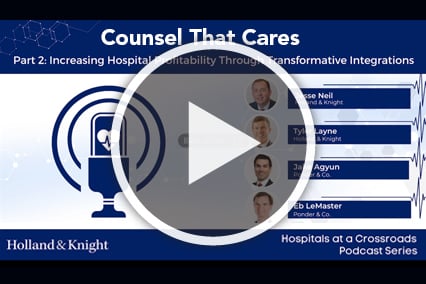Corporate Practice of Medicine
- Corporate practice of medicine (CPOM) and corporate practice of dentistry (CPOD) doctrines vary from state to state and require carefully structured management arrangements.
- Holland & Knight attorneys advise clinicians and healthcare investors in the formation and expansion of management companies across a range of specialties.

Overview
For more than 30 years, our attorneys have developed and implemented innovative business structures that comply with state corporate practice of medicine (CPOM) and corporate practice of dentistry (CPOD) doctrines. Companies and investors across the nation rely on Holland & Knight for its practical yet successful approach to CPOM/CPOD.
Few firms can approach our attorneys' extensive experience representing clinicians and healthcare investors in the formation and expansion of management companies focused on, among others:
- dental practices
- physician practices
- radiology
- vision
- dermatology
- women's health
- gastroenterology
The CPOM doctrine was first promulgated in the 19th century by the American Medical Association to distinguish services provided by physicians from those provided by non-physicians. Today, the doctrine is determined on a state-by-state basis and is focused on prohibiting laypersons or corporations from influencing a physician's professional judgment. Most states currently have laws that prohibit CPOM.
Jurisdiction is of critical importance in any discussion of the CPOM/CPOD doctrines, and some states are more challenging than others. Our lawyers have experience across all states, most recently closing a transaction in the state of North Carolina, which has some of the most stringent CPOM regulations. By understanding the nuanced distinctions between clinical and non-clinical services across states, Holland & Knight attorneys are able to structure management arrangements accordingly and move deals forward.
The Friendly PC Model
In some states, it is possible to structure arrangements using what is called a Friendly PC model. Transactions using the Friendly PC model are complicated and generally involve a number of documents, including management agreements, employment agreements, business associate agreements and financing agreements. Each of these agreements should be carefully drafted by experienced counsel to conform to a state's particular requirements and to ensure that the interests of the management company and its investors are protected. Ownership of a Friendly PC can vary as well, and the line between clinical and non-clinical is an important part of a transaction using the Friendly PC model.
Compliance and Government Enforcement
In addition to balancing day-to-day control issues with corporate practice regulations, clients should carefully consider:
- the management company's fee structure
- restrictive covenants
- board composition
- alternative dispute resolution
- compensation issues
Government investigations or enforcement actions and legal disputes sometimes arise in Friendly PC arrangements and originate with any of several parties from regulators, employees, Friendly PC owners, third-party payers and so on. Holland & Knight lawyers have the capabilities to help clients prevent and react to investigations or legal disputes when and if they arise.
Fee-Splitting, Anti-Kickback Statute and Stark Laws
Most states have laws that specifically prohibit fee-splitting, but the manner of the prohibition varies from state to state and across medical specialties. The prohibitions are commonly found in state medical practice acts as direct prohibitions or may be indirectly set forth within definitions of unprofessional conduct or professional misconduct. Violations of state fee-splitting prohibitions can result in disciplinary action against a physician's license. However, if federal healthcare program patients are involved, then the federal Anti-Kickback Statute and the Stark Law may also be violated. All of these laws must be considered when structuring the management arrangement between the Friendly PC and the management company.









